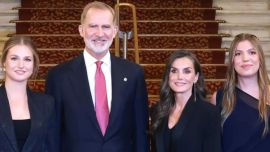Catalina Jack, a 37-year-old Argentine economist with two masters degrees, unceremoniously pulled up stakes in Buenos Aires three months ago and boarded a fast ferry to Uruguay. She got a job with a software firm and now looks out on the world from a home she rents near the beach resort of Punta del Este.
Her brother and his family had settled nearby a few weeks before. Two dozen friends have made the move or are doing so.
“I’d have preferred to continue working in Argentina,” she said. “Today, I don’t think there is a place for me there. The ones leaving are those who pay the most taxes, are the most productive and best educated.”
After Luis Lacalle Pou was elected president of Uruguay last November, the first non-leftist in 15 years, he announced plans to attract skilled immigrants and investment to energise his ageing, well-off developing nation of 3.5 million. What he didn’t know was how profoundly Covid-19 and economic crisis would overtake Argentina or how Uruguay’s exceptional public health system would give it one of the world’s best pandemic performances. The country’s death toll is only in the dozens.
The result is a brain and wealth flow from neighbouring Argentina. Carlos Enciso, Uruguay’s ambassador, told Radio Montecarlo that 100 Argentines a week are applying at its Buenos Aires consulate for Uruguayan residency. The head of Argentina’s tax authority, Mercedes Marco del Pont, told Télam news agency that in 2020 nearly half of the 504 Argentines who’ve taken up tax residency abroad – a move made by the wealthy – have chosen Uruguay.
Interior Ministry data show about 13,000 Argentines arrived to stay between April and September.
To some extent, the flow is building on an established pattern. Argentine money and summer tourists have poured into Punta del Este for generations, transforming it into Uruguay’s top beach resort with high rise buildings and trendy boutiques and restaurants.
Although strict anti-money laundering rules mean Uruguay isn’t as welcoming a destination for Argentine money as in the past, Central Bank data show non-resident deposits in local banks swelled by US$528 million in the year since primary elections in Argentina signalled the populist left was set to take power. Most of those deposits are thought to belong to Argentines.
The new departures are driven by increasing taxes and proposals for more, growing political division, deepening poverty and ongoing spikes in the virus. Argentina is suffering 41 percent inflation, ever-tightening currency controls, a collapse in GDP and bonds pointing to a high probability of default just weeks after the country exited the last one. More than 20,000 Argentines are dead from Covid-19.
Uruguay’s Lacalle Pou, who says he’d like to see 100,000 to 200,000 immigrants, has slashed the physical presence and investment requirements to obtain tax residency. Starting in July, foreigners who live at least 60 days a year in Uruguay and buy real estate worth more than US$388,000 qualify. Newcomers can also obtain residency by investing more than US$1.7 million in a business that creates at least 15 full-time jobs. His ruling coalition in congress also doubled the tax holiday for new residents to 10 years.
Uruguay, with a low fertility rate, growing elderly population and one of the highest incomes per capita in the region, has sometimes been called the Switzerland of Latin America. It’s socially liberal compared with its neighbours, with abortion, marijuana and gay marriage legal, making it a haven for certain groups of Argentines.
Vendors of wealthy goods and services are seeing the results.
Sales at Mercedes-Benz and Maserati dealer Alfalider in Punta del Este have soared more than three-fold this year to 70 vehicles, sales manager German Rodriguez said. About a quarter of the 510 students enrolled at the elite International College in Punta del Este are from Argentina, up from 20 percent in 2019, the school’s marketing and communications director Pedro Marquez said.
Gletir Corredor de Bolsa, which manages almost US$1 billion in mostly Argentine money, has added 200 new clients since the beginning of the year, director Diego de Achaval said. Deep distrust in the Argentine government and an “excessive tax burden” are driving friends and clients to Uruguay, he said from his office in Montevideo.
Federico Araujo, a director at Montevideo-based Nobilis Corredor de Bolsa SA, thinks Argentines could revitalize a stagnant wealth management industry.
“An Argentine client has an average ticket potentially three to four times that of a Uruguayan,” said Araujo, whose firm manages US$1.2 billion and has opened a dozen new accounts this year.
Legal firm Andersen has gone from three to seven staff members handling residency paperwork and entry permits, managing director Federico Fischer said.
”Most of the people who are moving here are in their prime working years of 40 to 55,” he said. “What you see are people with an inclination to be active and invest.”
Jack, the economist who arrived in June, says one of the most appealing aspects of her new home is its lack of political division.
“Something that is fascinating here is that you have a society determined to advance together, independent of the political party one belongs to,” she said. “Everyone is committed to rowing in the same direction. I haven’t seen that in Argentina. You are either on one side or the other.”
by Ken Parks, Bloomberg























Comments